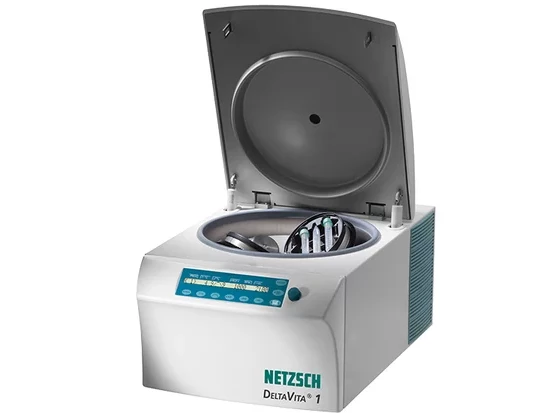31.07.2019
Extremely small batches for Active Pharmaceutical Substances – with the NETZSCH DeltaVita®® 1 it's now possible!
In particular for the development of nano-formulations for active pharmaceutical substances, innovative strategies and laboratory equipment are required, which enable comprehensive screening with minute quantities of available substance in the early research.

For this purpose, various developments such as modified planetary bead mills have been established, which allow findings from batches with minimal sample quantities, but whose results can only be transferred to a limited extent to production with agitator bead mills (production scale).
The dual centrifuge DeltaVita®® 1 (see Fig. 1) is based on the evolution of a classic centrifuge. In contrast to a conventional centrifuge rotor, the rotor is equipped with two rotary disks. The disks can be fitted with various plastic inserts, which can used to hold different sample containers.
Due to the symmetrically arranged rotary disks, a high loading of this dual centrifuge is possible without the machine becoming unbalanced. Thus, with the DeltaVita®® 1 with fully loaded rotary disks, up to 40 samples of 2 ml each can be processed in one run.
The chamber of the dual centrifuge is equipped with a powerful cooling system, so that samples can be run for several hours without interruption.
The sample placement at an angle of about 40° is novel. Similar to a planetary bead mill, the rotation on the primary orbit is superimposed by an additional rotation about the axis of the rotating disk (see Fig. 2).
If the sample vessels are now partially filled with grinding media, the result is a mill with loose agitated grinding media which, with about 1 ml of suspension, yields reproducible comminution results and can be used for very efficient milling processes.
Extensive investigations were carried out by Martin Hagedorn [1] at Losan Pharma. In his studies he compared the comminution results for different active pharmaceutical substances using the dual centrifuge, the planetary mill and the agitator bead mill. In doing so, he found very good agreement between the results from the dual centrifuge and the agitator bead mill, while the results from the planetary bead mill were in some cases quite different.
In another project, Prof. Massing also produced evidence for excellent results in the production of liposomes [2].
There are many possible applications, not limited to the pharmaceutical industry:
- Analysis of residues in food and feed
- Homogenization of components that are difficult to mix, e.g. viscous materials such as ointments, silicones and printing inks)
- Sample preparation for analysis processes
- Cell and tissue disruption for biotech samples
- Emulsion production
- Formulation development of a wide range of products
With the dual centrifuge, a new technological development is available that, in addition to a variety of applications, enables reproducible screening for feasibility studies or formulation development in the shortest possible time with minimal sample quantities.